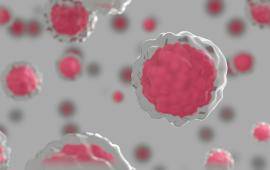
Integrative Oncology
Uterine Cancer and Integrative Oncology
Integrative treatment of uterine cancer is primarily focused to reduce the side effects of chemotherapy and radiotherapy.
During chemotherapy treatment, it is important to minimize side effects, so it is better tolerated and it is possible to complete the protocol cycles without interruption. It is necessary to control the immunity by leukocyte count test, since if the count is less than 3000, chemotherapy is postponed until it reaches these levels. On the other hand, the immune system is important in the control of cancer growth and once the chemotherapy cycles are finished it is necessary to recover the normal values of leukocytes in the shorter possible time.
There are formulas of Chinese Herbs that boost the immune system. Intravenous vitamin C also helps to strength the immune system. Side effects such as nausea, vomiting, fatigue can improve with precise formulas of Chinese plants intended to strengthen the digestive system in conjunction with acupuncture.
The diet plays a very important role to remove toxicity of the chemotherapy treatments and to improve quality of life.
When Cisplatin is given there is a risk of neurological toxicity that can affect the distal parts of the limbs (hands and feet). This side effect can be prevented or improved with acupuncture.
Integrative oncology can also help alleviate the side effects of radiation therapy, such as radiodermatitis or fatigue. Also reduce radiation long-term effects by using antioxidant nutrients.
In the treatment of cancer, it is very important to remove the cancer stem cell, so surgery is always the treatment that is associated with the best prognosis. Chemotherapy and radiotherapy are also addressed to eliminate cancer cells, but they cause significant side effects and weaken the body. Therefore, recovering and strengthening the body after these treatments, helps prevent cancer recurrences.
There are scientific studies on the anticancer effect of some Chinese Herbs in uterine cancer, such as Fritillaria cirrhosa and Scutellaria baicalensis (1) or Manchurian rhododendron (2).
There are also scientific studies on the use of orthomolecular medicine (vitamins and minerals) in uterine cancer that can help to increase the survival and quality of life of these patients.
PH’s control focused to reduce acidity levels in the body and an adequate diet help to better recovery and control of cancer disease.
(1) The Chinese herbs Scutellaria baicalensis and Fritillaria cirrhosa target NFκB to inhibit proliferation of ovarian and endometrial cancer cells. Kavandi L1, Lee LR, Bokhari AA, Pirog JE, Jiang Y, Ahmad KA, Syed V. Mol Carcinog. 2015 May;54(5):368-78
(2) Hyperin extracted from Manchurian rhododendron leaf induces apoptosis in human endometrial cancer cells through a mitochondrial pathway. Li FR1, Yu FX, Yao ST, Si YH, Zhang W, Gao LL. Asian Pac J Cancer Prev. 2012;13(8):3653-6.
Intravenous vitamin C 
intravenous vitamin C is used as an adjuvant treatment for endometrial cancer. p>
It can be used together with chemotherapy treatments, as long as it is suspended 48 hours before and after chemotherapy treatment.
It is essential to detoxify the body and enhance immune function after finishing chemotherapy cycles. A healthy immune system helps prevent recurrences.
Stages 
The most common type of uterine cancer tumor is adenocarcinoma. It originates in the innermost layer of the uterus (endometrium).
In order to determine the most appropriate treatment for uterine cancer, it is important, after surgery, to classify the tumor, that is, determine what stage it is in.
- Stage I: the cancer is located in the uterus and does not affect the lymph nodes of the pelvis (this stage can be subdivided into A, B, C depending on the depth of the tumor in the wall of the uterus).
- Stage II: the tumor has spread from the body of the uterus to reach the cervix or cervix.
- Stage III: the lesion reaches other structures outside the uterus (ovaries, vagina, pelvic lymph nodes) but remains confined to the pelvis.
Stage IV: the cancer can affect the rectum, bladder and/or has reached other more distant organs.
The vast majority of patients are diagnosed in the earliest stages, so the prognosis in these cases is very good.
The cells that form the endometrial tumor divide depending on the grade. The grade is related to the resemblance that the tumor cells have with respect to the normal cells of the endometrium, and indicates the speed with which the cancer can develop:
- Grade 1 or well differentiated: the cells look very similar to normal cells and are tumors that grow slowly.
- Grade 2 or moderately differentiated: they bear some resemblance to the cells of origin and their growth is faster than in grade 1.
Grade 3 or undifferentiated: they do not resemble the cells of origin and grow quickly and spread more frequently.
Conventional Treatment 
The four basic types of treatment for women with endometrial cancer are:
• Surgery
• Radiotherapy
• Hormonal therapy
• Chemotherapy
Surgery: Surgery is the main treatment for most women with this cancer. But in certain circumstances, a combination of these treatments can be used. The treatment option depends largely on the type of cancer, and the stage of the disease at the time it is discovered. It consists of a hysterectomy, often together with a salpingo-oophorectomy, and the removal of lymph nodes.
Chemotherapy: Medications used to treat endometrial cancer may include:
• Paclitaxel (Taxol®)
• Carboplatin
• Doxorubicin (Adriamycin®) or liposomal doxorubicin (Doxil®)
• Cisplatin
More often, two or more medications are combined for treatment. The most common combinations include:
- Carboplatin with paclitaxel
- Cisplatin with doxorubicin.
Ask for opinion and find an appropriate solution to your problem
ONLINE Doctor Consultation






